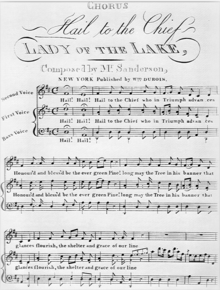James Sanderson (musician)
James Sanderson (or Saunderson[1]1769–c.1841) was an English musician, now remembered as a songwriter. The tune for "Hail to the Chief", the presidential anthem of the United States, is attributed to him, taken from a Scottish Gaelic melody.[2][3]
James Sanderson | |
|---|---|
| Born | 1769 |
| Died | circa 1841 |
| Occupation | Composer |
Notable work | "Hail to the Chief" |
Life
Sanderson was born at Workington in Cumberland. He taught himself the violin, and at age 14 was taken on at the Sunderland Theatre. In 1784 he established himself at South Shields as a teacher, and in 1787 became leader at the Newcastle Theatre.[4]
In 1788 Sanderson went to London and led the orchestra at Astley's Theatre. He was engaged in 1793 by the Royal Circus as composer and musical director; he remained there many years, producing incidental music for dramas, and vocal and instrumental pieces.[4] Sanderson worked closely with John Cartwright Cross, who usually provided words for a long series of burlettas, melodramas and pantomimes. Cross devised a way for the Royal Circus, which became the Surrey Theatre, to get round restrictions on the classic plays they could show: it involved rendering the lines into rhymed couplets, and adding musical accompaniment.[2][5]
Sanderson died about 1841.[2]
Works

Sanderson began as a composer with instrumental accompaniment to William Collins's Ode on the Passions, which George Frederick Cooke recited at his benefit in Chester. The accepted tune for the Robert Burns poem Comin' Thro' the Rye was composed by him. A ballad, Bound 'Prentice to a Waterman, sung in the drama Sir Francis Drake (1800), was regularly introduced into nautical plays for half a century. Two of Sanderson's ballads were still reprinted in the Musical Bouquet of 1874.[4]
Notes
- Barry Jones (2014). James Sanderson. Hutchinson Concise Dictionary of Music. New York and London: Routledge.
- Golby, David J. "Sanderson, James". Oxford Dictionary of National Biography (online ed.). Oxford University Press. doi:10.1093/ref:odnb/24625. (Subscription or UK public library membership required.)
- Robert A. Nowlan, Ph.D. (31 January 2016). The American Presidents From Polk to Hayes: What They Did, What They Said & What Was Said About Them. Outskirts Press. p. 63. ISBN 978-1-4787-6572-1.
- Lee, Sidney, ed. (1897). . Dictionary of National Biography. 50. London: Smith, Elder & Co.
- Knight, William G. (1997). A Major London 'Minor': The Surrey Theatre (1805–1865). London: The Society for Theatre Research. pp. 9–10. ISBN 0854300619.
External links
- Attribution
![]()